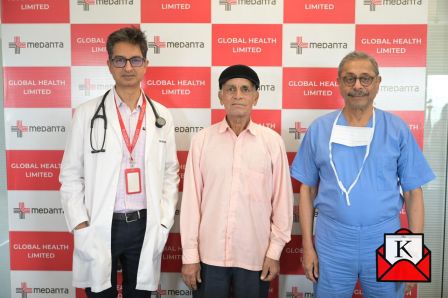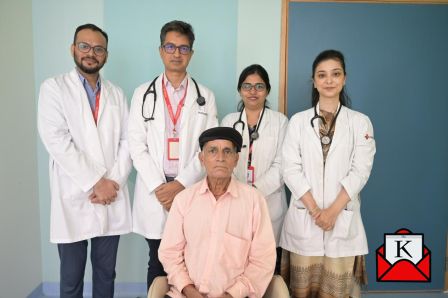Medanta Treats 56-Year-Old Man With Car-T Cell Therapy


A 56-year-old man with non-GCB DLBCL (Non-Hodgkin’s Lymphoma), a rare and rapidly developing lymph node cancer with a terrible prognosis, has been effectively put into remission with CAR-T Cell Therapy by Medanta. This case is notable for its creative strategy of specially tailoring the treatment to deal with the patient’s various issues, such as the emergence of liver toxicity and pericardial TB, which all caused treatment conditions to become more problematic and delayed. After trying several different forms of treatment at other facilities, the 56-year-old patient, Mr. Sundar Lal Govala, arrived at the Bone Marrow Transplant (BMT) Division of the Cancer Institute in Medanta Gurugram.
In 2022, the patient discovered a mass in his stomach after experiencing abrupt onset symptoms, such as severe vomiting and difficulties eating, which prompted him to seek medical assistance. After receiving a non-Hodgkin lymphoma diagnosis, he tried unsuccessfully to treat the condition at various facilities. His condition worsened even after receiving immunotherapy drugs like Brentuximab and chemotherapy treatments like R-CHOP, GDP, and IR2.
In 2024, he approached Medanta Gurugram’s Division of Bone Marrow Transplant (BMT), Cancer Institute, where a multidisciplinary team led by Dr. Nitin Sood (Senior Director of Medical Oncology & Bone Marrow Transplant), Dr. Manisha Jain, Dr. Bhaarat, and Dr. Tejasvini Vaid, identified the cutting edge treatment of CAR-T Cell Therapy. Before CAR-T cell infusion, he was diagnosed with pericardial tuberculosis, the treatment for which affected his liver.
To stabilize the patient and treat liver toxicity while preparing him for CAR-T Cell Therapy, a multidisciplinary team at Medanta comprising specialists in infectious diseases, cardiac disease, and liver worked together across specialties. The patient received the CAR T-cell infusion following six weeks of meticulous preparation. The surgery went well even though the therapy had the potential to cause serious side effects like neurotoxicity and cytokine release syndrome (CRS). A PET scan during his one-month follow-up showed no signs of active illness, indicating a remarkable remission for a patient who had not responded to several treatments before.
The versatility of CAR T-cell therapy in the treatment of extremely resistant lymphomas is demonstrated by this example. The team’s successful management of consequences, including as liver damage and tuberculosis, highlights the importance of individualized treatment and a strong multidisciplinary team. Even in the most difficult situations, the customized approach at Medanta Gurugram showed the possibility of remission, despite the patient’s advanced stage of the disease and several previous lines of unsuccessful therapy.
Patients with refractory lymphoma now have hope thanks to Medanta Gurugram’s effective use of CAR-T cell therapy, which represents a major development in cancer care. It emphasizes the value of individualized treatment, efficient complication control, and the promise of CAR-T cell therapy. In addition to offering insights for modifying this therapy to other difficult tumors with few treatment options, the instance highlights the importance of a multidisciplinary approach.
Priyanka Dutta
